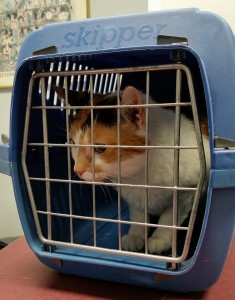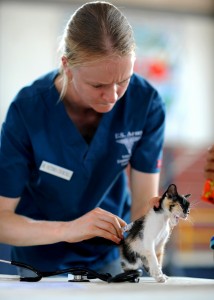by Soojin Um
Staff Writer
 Vaccinations help prevent a myriad of diseases and illnesses from affecting our cats. They are designed to protect our loved ones and are an important part of feline health. However, there are so many vaccines out there, and it’s difficult to find out which ones should be given and how often. There’s also the debate on over-vaccination and under-vaccination. What can be a little disconcerting is the fact that even experts don’t always agree on these issues.
Vaccinations help prevent a myriad of diseases and illnesses from affecting our cats. They are designed to protect our loved ones and are an important part of feline health. However, there are so many vaccines out there, and it’s difficult to find out which ones should be given and how often. There’s also the debate on over-vaccination and under-vaccination. What can be a little disconcerting is the fact that even experts don’t always agree on these issues.
How do vaccines work?
Vaccination is a process where the body is introduced to biologically prepared agents that look and act like bacteria or a virus but do not themselves cause any disease. The purpose of this is to help prepare the immune system to identify and fight the bacteria or virus should they enter the body. In essence, it’s like training soldiers to defend against a specific enemy. The more accurate the simulation of the enemy, the more effective and efficient the soldiers will be at defending against the attack. This is called an adaptive immune system where it acquires an immunological memory of a specific bacteria or virus and will know how to fight it in the future.
Which ones should your cat get and how often?
 There are many vaccines out there for cats. They are divided into core and non-core categories. Core vaccines are ones every cat should get. These protect against illnesses that can affect all cats. The American Association of Feline Practitioners advise that all cats get vaccines for: panleukopenia, herpesvirus, and calicivirus. Non-core vaccines aims to protect against ailments caused by the cat’s environment and lifestyle. There are many vaccines in this category, but the leading examples are for: feline leukemia virus, rabies, feline immunodeficiency virus, and ringworm (dermatophytosis), among others. Your veterinarian can advise which ones are recommended. The frequency is typically every year or every three years, depending on the cat and its medical history. That too can be determined by your vet.
There are many vaccines out there for cats. They are divided into core and non-core categories. Core vaccines are ones every cat should get. These protect against illnesses that can affect all cats. The American Association of Feline Practitioners advise that all cats get vaccines for: panleukopenia, herpesvirus, and calicivirus. Non-core vaccines aims to protect against ailments caused by the cat’s environment and lifestyle. There are many vaccines in this category, but the leading examples are for: feline leukemia virus, rabies, feline immunodeficiency virus, and ringworm (dermatophytosis), among others. Your veterinarian can advise which ones are recommended. The frequency is typically every year or every three years, depending on the cat and its medical history. That too can be determined by your vet.
Are there any dangers to vaccination?
 There are always some risks when introducing anything into the body, and it’s no different for vaccines for cats. A common side effect is a swelling and/or soreness in the injection site. There can also be decreased appetite and a fever. More serious reactions can include swelling around the face, difficulty breathing, and repeated vomiting. If your cat experiences these symptoms, take them to the vet immediately.
There are always some risks when introducing anything into the body, and it’s no different for vaccines for cats. A common side effect is a swelling and/or soreness in the injection site. There can also be decreased appetite and a fever. More serious reactions can include swelling around the face, difficulty breathing, and repeated vomiting. If your cat experiences these symptoms, take them to the vet immediately.
We love our cats and want nothing but the best for them, especially regarding health. Vaccinations are an important aspect in maintaining the health of your cat. There can be some risks and concerns, but it’s always a good idea to consult with your veterinarian regarding immunization and other concerns. They will be your best resource on matters of health and medicine. There’s also no harm in getting a second opinion, and good doctors will encourage their clients to seek it. After all, everyone wants the best for your cat.
Please let us know your thoughts on this topic and/or give us feedback here or on Facebook.

